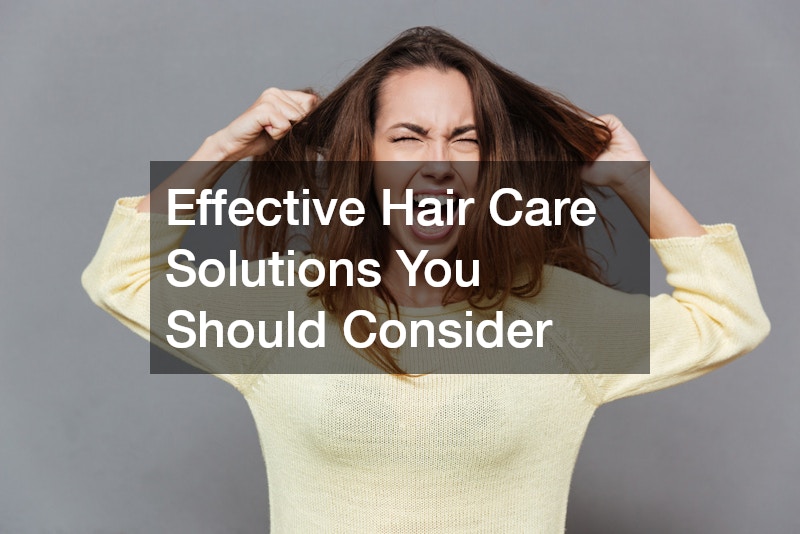Effective Hair Care Solutions You Should Consider


This guide will also explore the role of ingredients in hair care products, helping you decipher which elements truly promote hair health. From natural oils like coconut and argan to scientifically backed ingredients such as biotin, keratin, and peptides, knowing what to look for in your products can make a significant difference. We’ll also highlight the potential harm that can come from chemicals such as sulfates, parabens, and silicones, which are often found in commercial products and can lead to long-term damage when used improperly.
For those dealing with specific hair challenges, like thinning hair or excessive shedding, we’ll explore targeted treatments and lifestyle changes that can promote healthier hair growth. Hormonal imbalances, vitamin deficiencies, and even everyday habits like how you wash and brush your hair can impact your hair’s overall condition. Recognizing these factors allows you to take a holistic approach to hair maintenance, considering not just the products you use but also how your daily routines and wellness choices contribute to the strength and appearance of your hair.
Make sure to understand both the external and internal factors that affect your hair. You’ll be better equipped to create a routine that supports lasting results. This will leave your hair nourished, vibrant, and full of life.
Hair Loss Prevention

Hair loss is a common concern that affects many individuals, regardless of age or gender. To combat this issue, it’s vital to implement effective hair care routines tailored to your specific needs. Incorporating products that strengthen hair and promote scalp health can significantly reduce hair loss. Additionally, maintaining a balanced diet and managing stress levels can play a crucial role in preventing hair loss.
For those experiencing significant hair loss, wigs offer an excellent solution. Wigs have evolved over the years to provide natural-looking alternatives that can boost confidence and offer versatile styling options. From synthetic to human hair wigs, the choices are vast, catering to various preferences and budgets. Proper wig care is essential to ensure longevity and maintain a natural appearance.
A comprehensive approach to hair loss prevention includes consulting professionals who can provide personalized advice. Trichologists and dermatologists can assess your scalp condition and recommend treatments such as topical solutions or hair growth supplements. Understanding the underlying causes of hair loss and addressing them through targeted practices can yield impressive results.
Natural Remedies for Hair Growth
Several natural remedies have stood the test of time when it comes to promoting hair growth. Incorporating these into your hair care routine can yield significant benefits. Essential oils such as rosemary and peppermint are renowned for their potential to stimulate blood circulation in the scalp, fostering a conducive environment for hair growth. Regular scalp massages with these oils can invigorate hair follicles and enhance growth.
Participating in a structured hair program can also be beneficial for those seeking to boost hair growth. These programs often include a combination of topical treatments, dietary adjustments, and lifestyle changes specifically designed to encourage healthy hair development. Consistent adherence to such programs can help in achieving noticeable improvements in hair density and health over time.
Furthermore, natural remedies like aloe vera and onion juice have gained popularity for their reputed hair growth benefits. Aloe vera’s moisturizing properties help maintain the scalp’s health, while onion juice’s high sulfur content can strengthen hair strands. Integrating these remedies into your hair care routine requires patience and consistency but can be a worthwhile pursuit for noticeable gains.
Hair Washing Tips
Proper hair washing is crucial for maintaining scalp health and ensuring that your hair remains clean and vibrant. Using the right shampoo and conditioner for your hair type can prevent issues such as excess oil production, dryness, or dandruff. It’s vital to choose products free of harsh chemicals and sulfates, which can strip your hair of its natural oils.
An often-overlooked aspect of hair washing is the quality of water used. Hard water can be detrimental to your hair, leading to dryness and buildup. Installing a water softener system can be an excellent investment, as it ensures that the water you use is gentle on your hair. This can make a noticeable difference in the texture and overall health of your hair over time.
Additionally, the frequency of washing your hair should be tailored to your individual needs. While some may need to wash their hair daily, others might find that washing every few days is sufficient. Over-washing can strip the hair of essential oils, while under-washing can lead to buildup and clogged follicles. Finding the right balance is key to effective hair care.
Lifestyle Considerations

Various lifestyle factors can significantly impact your hair’s health. Leading a balanced lifestyle with good nutrition and stress management is crucial for maintaining healthy hair. Nutrient deficiencies can weaken hair, so incorporating a diverse diet rich in vitamins and minerals can provide much-needed support for hair growth and strength.
Addressing underlying health issues is also essential for optimal hair care. For instance, those struggling with addiction might benefit from seeking help from addiction treatment clinics. Addressing addiction can lead to improved overall health, which in turn can positively influence hair health. Ensuring that the body is free from toxins and nutrients are well absorbed can foster stronger and healthier hair.
Engaging in wellness activities such as regular exercise can also have a positive impact on hair health. Exercise improves blood circulation, including to the scalp, which can stimulate hair growth. Additionally, managing stress levels through mindfulness practices and adequate sleep can prevent stress-induced hair loss and promote a healthier scalp environment.
Dry and Frizzy Hair Management
Dry and frizzy hair is a common issue that many individuals struggle with. Implementing an effective routine that focuses on moisturizing and nourishing hair can alleviate these concerns. Using hydrating shampoos and conditioners, followed by deep conditioning treatments, can help to lock in moisture and reduce frizz.
Professional guidance from hair schools can be invaluable for those seeking advanced techniques to manage dry and frizzy hair. Hair schools often offer courses and workshops where hairstylists learn and teach the latest methods in hair care and styling. Leveraging their expertise can provide you with personalized recommendations and treatments specific to your hair type.
Additionally, reducing the use of heat-styling tools and opting for air-drying methods can prevent further damage and dryness. When using styling tools, ensure they’re set to the lowest heat setting, and always use a heat protectant spray. These adjustments can significantly improve the condition of your hair over time, resulting in less dryness and frizz.
Practices for Color-Treated Hair
Color-treated hair requires special care to maintain its vibrancy and health. First and foremost, using shampoos and conditioners explicitly formulated for color-treated hair can prevent color from fading too quickly. These products are designed to be gentle and nourishing, ensuring that the hair remains hydrated and vibrant.
Regular visits to a wellness center can provide access to advanced treatments that maintain and protect color-treated hair. Services such as deep conditioning and gloss treatments can enhance the appearance of the color while also fortifying the hair. Consulting with professionals at these centers can offer you tailored advice and treatments.
Moreover, incorporating hair masks and leave-in treatments into your routine can provide additional hydration and protection. These products often contain ingredients that help to seal the hair cuticle, locking in color and moisture. Consistent use of these treatments can extend the life of your color and keep your hair looking its best.
Dandruff and Itchy Scalp Treatments

Dandruff and itchy scalp are issues many people face, and proper hair care can alleviate these conditions. Choosing the right shampoo and scalp treatments that target dandruff can significantly reduce flaking and itchiness. Ingredients such as salicylic acid, tea tree oil, and ketoconazole are effective in combating dandruff.
Working with healthcare providers through telehealth services can provide convenient access to specialized care. Dermatologists can offer prescriptions and advice through telehealth platforms, ensuring you receive the appropriate treatments for your scalp condition. This modern approach to healthcare can make managing scalp issues more accessible and effective.
Additionally, maintaining a consistent hair care routine that includes regular scalp exfoliation can help keep dandruff at bay. Exfoliating the scalp removes dead skin cells and residue, promoting a healthier scalp environment. Incorporating this practice bi-weekly can enhance the effectiveness of other dandruff treatments.
Care Tips for Different Hair Types
Different hair types require specific care routines to ensure optimal health and appearance. For instance, curly hair often benefits from hydration-focused products and techniques. Using sulfate-free shampoos and rich conditioners can help retain moisture and prevent frizz in curly hair. Regular deep conditioning treatments are also beneficial.
For individuals with thin or fine hair, lightweight products that add volume without weighing the hair down are ideal. Volumizing shampoos, conditioners, and styling products can enhance the fullness of fine hair. Additionally, techniques such as blow-drying with a round brush can add volume and lift at the roots.
For those facing severe hair issues, IV therapy services can offer a unique approach to hair care. Nutrient-rich IV therapies can ensure the body receives essential vitamins and minerals directly, which can, in turn, improve the health and strength of hair. Consulting with professionals who offer these services can provide a more personalized method to enhance hair health.
Hair Styling Tool Proper Usage
The proper usage of hair styling tools is essential to prevent damage and ensure the best results. Heat styling tools such as flat irons, curling wands, and blow dryers should always be used with a heat protectant spray. This creates a barrier between the hair and the heat, reducing the risk of damage.
When using these tools, it’s important to keep them clean and in good condition. Regularly wiping down the plates of flat irons and curling wands prevents buildup and ensures even heat distribution. For blow dryers, cleaning the air intake regularly can prevent overheating and extend the life of the tool.
Proper storage of hair styling tools, such as on a bathroom vanity, can also contribute to their longevity. Keeping these tools in a dry, safe place can prevent damage and ensure they remain in optimal working condition. Adopting these practices helps in maintaining healthy hair and achieving great styling results.
Diet Methods for Great Hair Health

Your diet plays a crucial role in the health and appearance of your hair. Consuming a balanced diet rich in vitamins and minerals is essential for maintaining strong and lustrous hair. Foods high in proteins, such as lean meats, fish, eggs, and legumes, provide the building blocks necessary for hair growth.
Including a variety of fruits and vegetables in your diet can ensure you receive essential vitamins like A, C, and E, which are important for scalp health and hair strength. Berries, spinach, avocados, and sweet potatoes are excellent choices that contribute to overall hair health. A diet plan supported by a nutritionist can provide more personalized insights.
Finally, visiting local cafes that offer healthy meal options can support your hair care goals. Many cafes now provide nutritious foods and smoothie options packed with vitamins and minerals that promote hair health. Incorporating these healthy choices into your diet can have a positive impact on your hair’s strength and vitality.
Incorporating protective hairstyles, minimizing heat styling, and selecting products that align with your hair type are all crucial steps in developing a healthy routine. It’s also important to remain mindful of environmental factors, such as sun exposure and humidity, which can impact the moisture and texture of your hair. Investing in high-quality, nutrient-rich products designed to strengthen and protect can make a significant difference, especially when paired with regular trims to prevent split ends and damage.
Beyond external care, ensuring that your body receives the necessary vitamins and nutrients, like vitamins A, C, and E, biotin, and omega-3 fatty acids, can boost hair strength and shine from the inside out. If you’re struggling with more serious concerns, such as significant hair thinning or chronic scalp issues, consulting a dermatologist or trichologist can provide valuable insights and lead to more targeted treatment options.
Ultimately, the key to effective hair care lies in patience, consistency, and making informed decisions about how to care for your hair on a daily basis. By listening to your hair’s needs, adjusting your routine as necessary, and prioritizing both health and appearance, you can achieve the vibrant, luscious locks you’ve always desired. With the right approach, beautiful, healthy hair is well within your reach.


